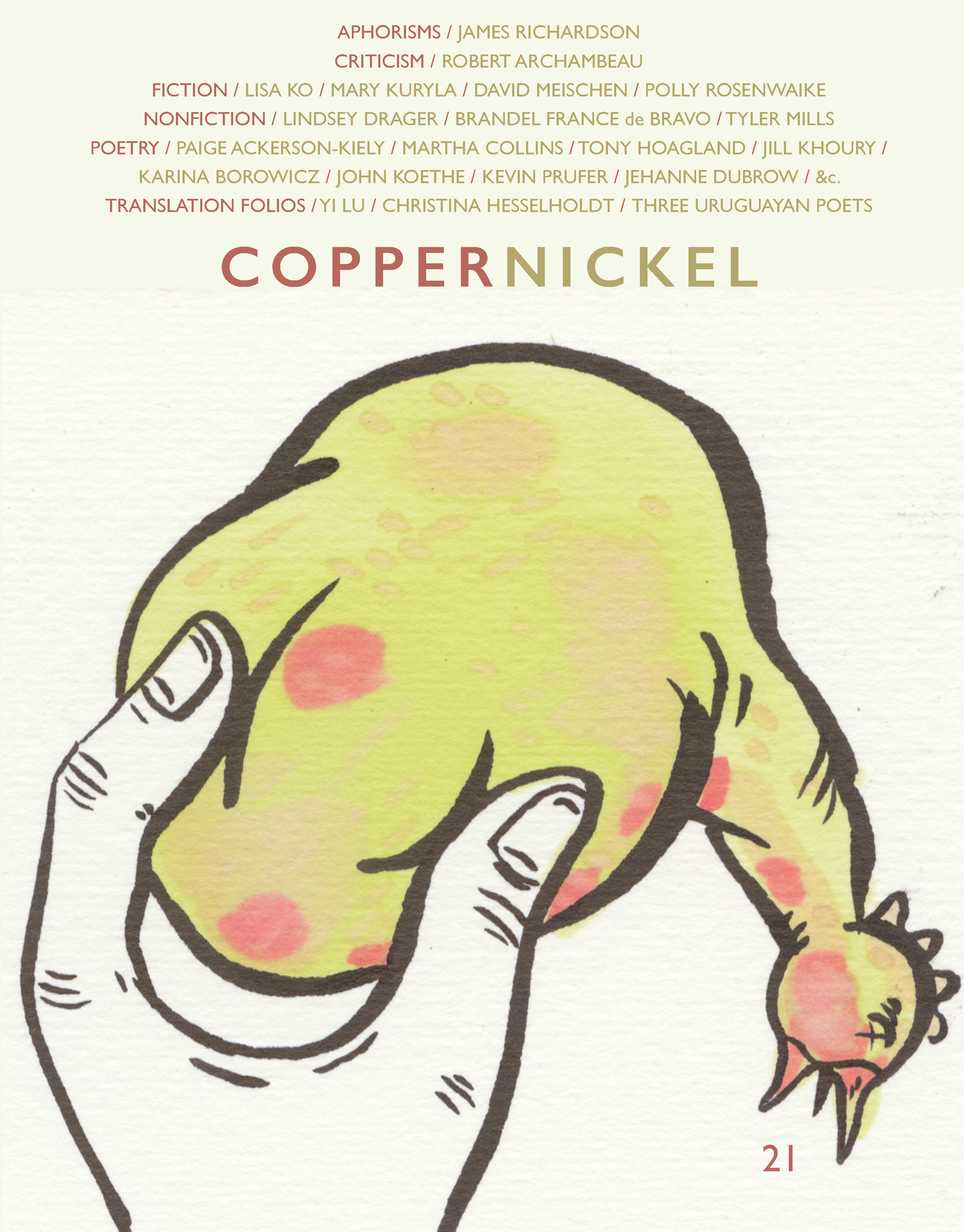When my mother sent me for cigarettes I’d buy
a candy bar too, sign her name to the book
and walk out with the green and white carton,
Virginia Slims 100s, under my arm,
the chocolate already gone. Sugar, my god!
like newspaper cartoon panels spread out
on the kitchen table where I’d pretend to smoke,
a little imitation of my mother.
After the corner store closed we made our groceries
at Dillons, joined the impersonal. A villain
snatched her purse there when I was away at college
and on the phone she told me, excitedly,
how Topeka police chased the culprit, and she named
each street, each intersection and landmark,
the whole adventure, just for her.
I’m grateful now for that sedentary house
though I’ve grown as large on candy as John Candy.
My older brothers left home and our meals stayed
the same, a skillet high with beef stroganoff,
pot roast in broth, chili con carne,
cheese sandwiches with mayo, flocks of fried chicken.
Then the whole house went on a diet of cold
tofu cubes, a broken disc of lemon in a water glass,
cottage cheese measured onto lettuce,
and then back to London broil the next night,
no questions asked—lovely. We were emotions
without form, and I carry it with me,
not just in frame, arm and jowl and belly,
but here in the intergalactic space of written
thought, the infinite stage where we come
talk to each other. Sugar makes me curious.
After Katrina, I took the diet where you eat meat,
and lost almost a hundred pounds from a surfeit
of bacon, sautéed pork medallions, beef & lamb.
The weight fell away like a knight’s armor
after a joust. I bought shirts at a regular store.
I played softball and ran bases, bounded them,
as if on a new, more forgiving planet. And
I went crazy, evened out, broke down again,
inconsolable at the finale of Six Feet Under,
tears for my mother, postponed, and more
torrented for delay. Opening the book of grief
requires that you read all the way to the end,
every time. Driving to work, I stopped
bewildered at a gas station, paid cash for two
Snickers that provided more salvation
than I have ever known from religion’s acres.
I write about the West and the South and home
their tenderness and trouble and the weird spirits
that brake the best days. Still I find myself down
by the river at twilight despite the stories
of jaguars under the bridge. All day was interview
where the jaguars were questions. On the bridge
deliberate-seeming people walk by like victorious aliens,
past the consequential palaces lit as before, the faces
turning in their rotisseries. It is like waking a sleeper
in his illness. Deer tracks through downtown snow;
industry and highway puff the unappeasable whiteness,
unappeasable and motherly, ash from midnight cigarettes.
My mother looked a little bit like Alex Chilton,
lead singer of the Box Tops, and then the greatest
rock band of all time, Big Star, and a solo career.
My mother had a solo career, playing solitaire
and watching her own TV in the kitchen, and dying
before everyone else. I used to see Chilton often
around New Orleans, in line at the grocery store,
walking down Esplanade Avenue, and on stage.
Dying, he urged his wife to run the red lights
—his last words—and when I had to leave
my mother in the hospital that was hard
and then again at the funeral home I set
a marble under her folded hands, don’t know
why. It’s been ten years. Ten fingers, the
closed eye of each knuckle, each nail
its years’ fullest day moon. Which of us
shed the other? The scar from opening a window,
such force to move the wood frame, so little
to shatter the glass it held. To be held like that
again. Ten years, so forty seasons, eighty
endings and beginnings, well, always a little
gust in them which is the sigh of how
she would note leaf and bird, porch shadows.
One hand to hold the coffee cup, one the cigarette.
The red ember she became at midnight. Red light. Eye.
